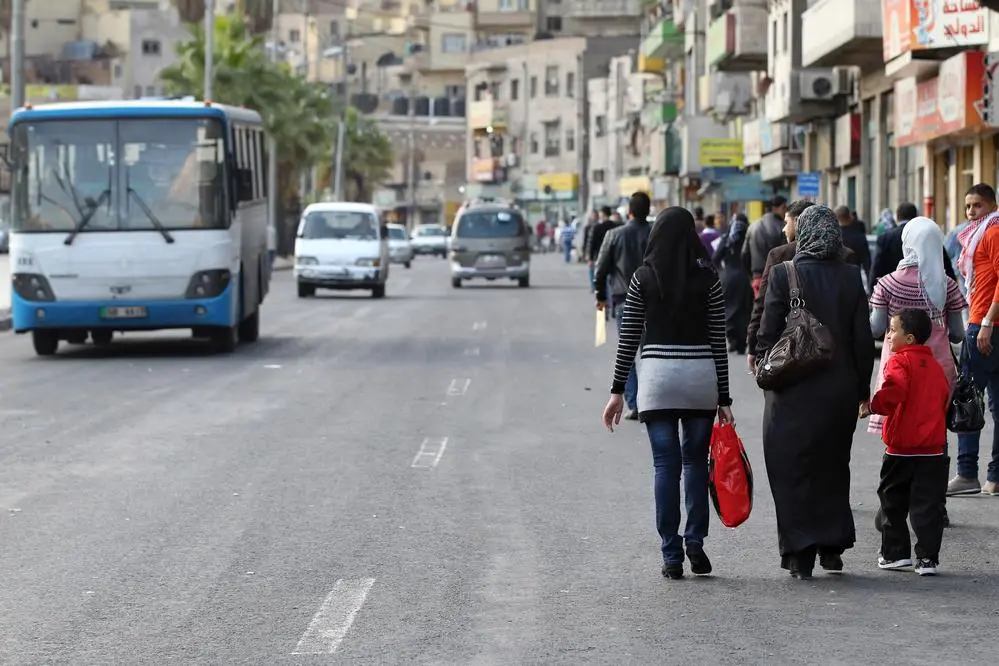PHOTO
Friedrich Ebert Stiftung (FES) on Tuesday organised a panel discussion titled "Towards an Equitable, Innovative, and Inclusive Public Transport", as part of its second annual event "Transportation in Jordan: Are we serious about a solution?", which seeks to address the problem of public transportation in Jordan through innovative solutions.
The event, which was inaugurated by Amman Mayor Yousef Shawarbeh, also aimed to provide insights into political, technical and gender perspectives in the field of transportation.
FES Coordinator of Regional Climate and Energy Project Rochard Probst stated: "The discussion title reflects the feelings of many Jordanians suffering from heavy congestion on daily basis," noting that "public transportation is unfortunately still not a priority in Jordan although it should, especially as a policy issue that affects the lives of citizens socially, economically, and politically".
"Amman, with its 800,000 km2 and nearly 4 million population, is like any other city, facing many challenges in the field of energy, environment, infrastructure, and of course, public transportation," Shawarbeh said, stressing that "we are aware of the people's suffering and we admit having a problem, but what matters now is providing solutions".
He cited the Bus Rapid Transit as the current plan towards an improved urban public transportation system, saying that "its implementation is carried on now in spite of the previous halt it witnessed".
"Another bus-based plan, whose legal documents are in the last stages, should be implemented by 2021," he added.
The new 3-year bus plan will include the importation of 286 busses with the highest standards, equipped with Wi-Fi, ACs and e-payment systems, according to the mayor.
Busses will have fixed routes, cover more areas of Amman and follow a consistent timetable. This launch will be accompanied by a mobile phone application through which users will be able to know all the information about the routes and timings.
A keynote presentation by Ayman Smadi, director of the MENA International Association of Public Transportation and the MENA Centre for Transport Excellent, titled "Regional Perspectives on Public Transport", highlighted a number of issues.
Smadi outlined the effects of technology on the transportation sector, especially with the emergence of ride-hailing apps like Careem and Uber, stressing the need to involve similar technologies in other public transport systems so as to meet the needs and expectations of users.
He also discussed the importance of taking environmental issues into account, and focusing on the needs of the most vulnerable groups of society such as women, the elderly, and people with special needs.
In a panel discussion moderated by Hazem Zureqiat, Shahr Aloul, SADAQA co-founder, addressed the effects of public transport on women employment, pointing out that "according to a study by the International Youth Foundation, 40 per cent of women refrain from getting a job due to the challenges they face in finding proper public transportation, which explains the limited participation of women in the Jordanian job market [around 14 per cent]".
For his part, Director of GAM Public Transport Directorate Abdelraheem Wrekat stressed that "the municipality is working its hardest towards providing citizens with a comfortable, safe, accessible and environment-friendly transportation system, in addition to developing infrastructure and pavements improvement projects".
On the new public transport law, Mohammad Assad, CSBE founding director, highlighted a policy study report conducted by the foundation, which "examines these laws and looks into current policies and practices in addition to examining realistic and applicable changes that may improve the quality of public transport in the country".
FES displayed the outcomes of its campaign "Ma3an Nasel" ("Together We Reach" in Arabic), including designing an unofficial transportation map of Amman, presenting the city's public transportation system in a readable and user-friendly format available as a mobile app.
In April, the campaign launched "Khutoutna" (or "Our Routes"), an app allowing users to plan their trips by identifying their pickup and drop off points.
"Public transport is in the core of achieving social justice because it entails fair access to work and healthcare as well as achieving an energy-efficient society, which all fall under the values that FES is committed to achieve," Energy and Climate Policy Programme manager Hamzeh Bany Yasin told The Jordan Times.
The tangible outcomes of the event, according to Bany Yasin, will be evident in the long term, but the main goal now is to "highlight the efforts being exerted by our partners, and to empower the civil society, which has innovative and productive ideas, to reach out to the decision makers in Jordan towards achieving more development".
"There are some promising steps that have been taken such as the map application, but there is an underperformance in marketing them and introducing them to the community," Mohannad Lahham, an environmental analyst said, adding that "the event tackled real and serious problems, but it should have witnessed a stronger presence of the decision makers in Jordan to address the people's concerns and needs and make decisions accordingly".
© Copyright The Jordan Times. All rights reserved. Provided by SyndiGate Media Inc. (Syndigate.info).





















